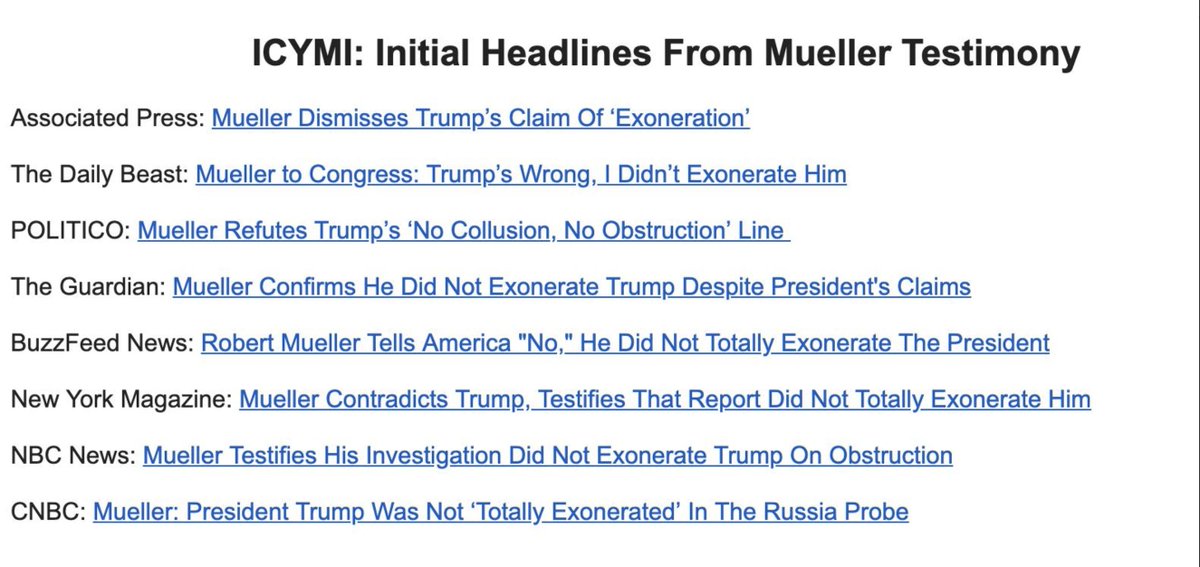
Trump directs McGahn to remove the new special counsel: Volume II, page 4 of the Mueller report
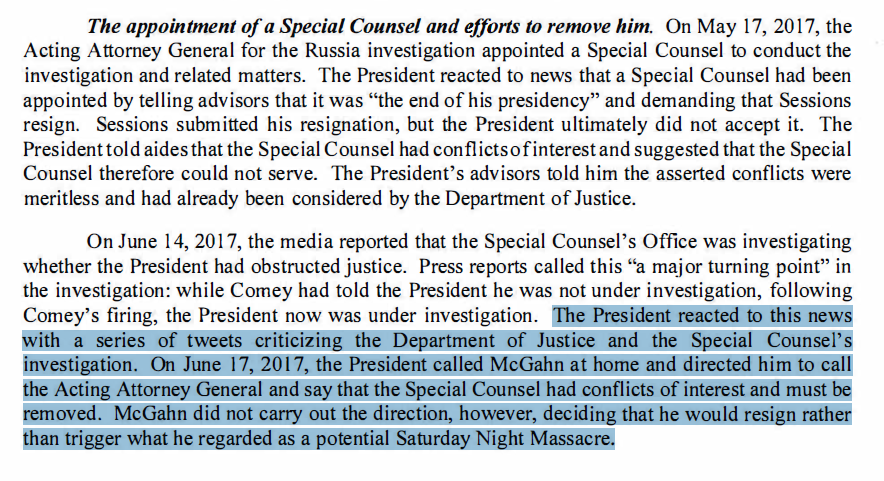

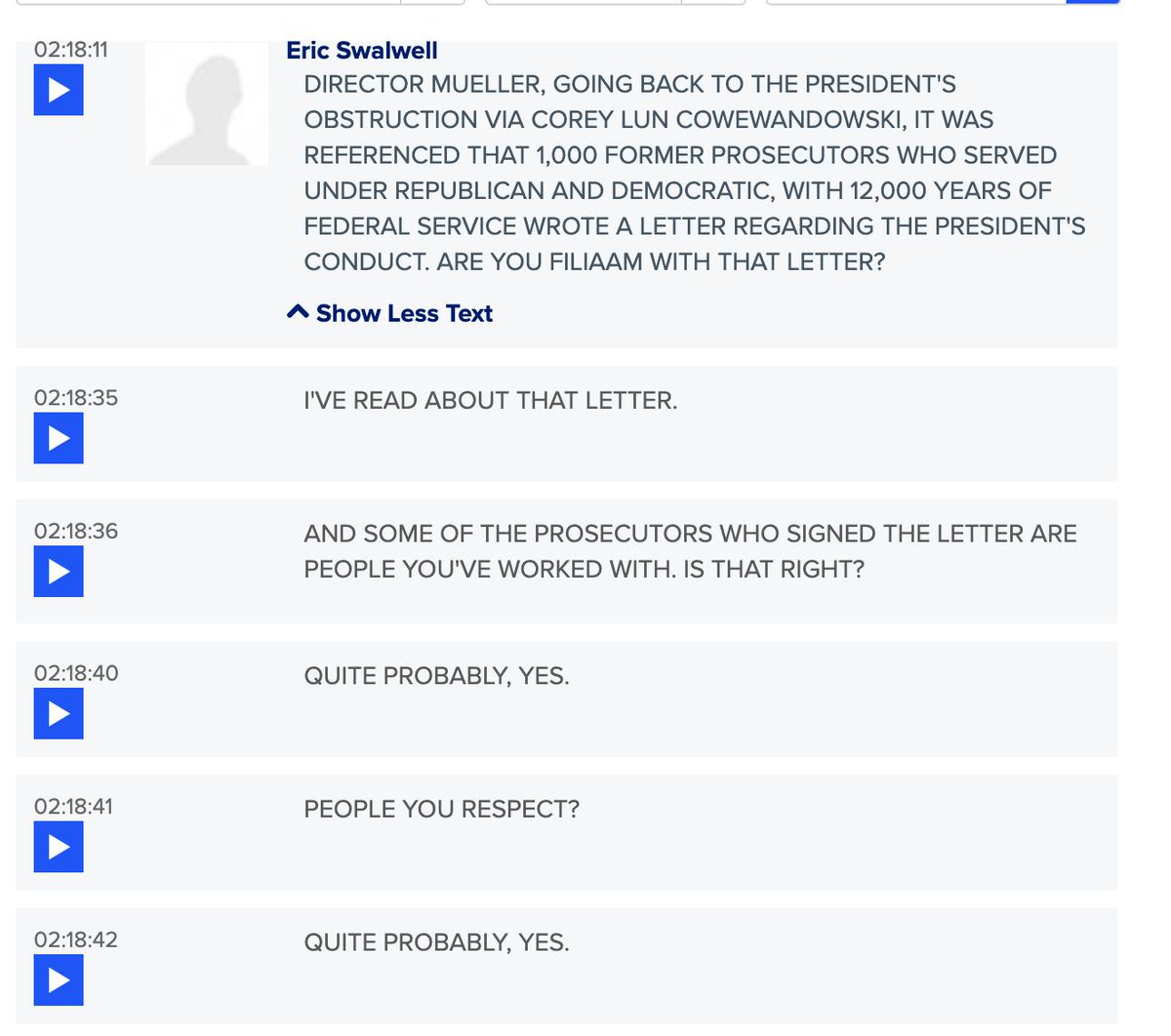
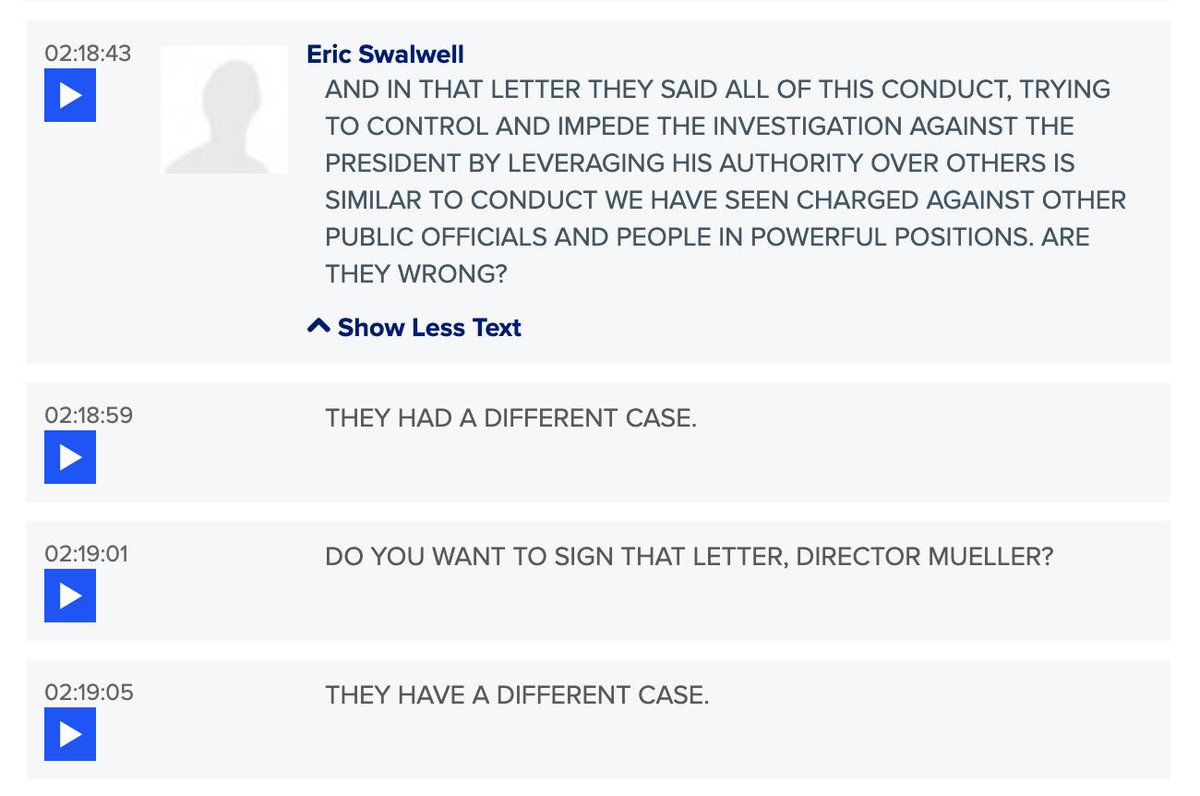
The only reason you didn't charge the president with obstruction is because OLC guidelines prevented you from doing so?
MUELLER: "Correct."
Can the president be prosecuted for obstruction when he leaves office?
MUELLER: "Yes."
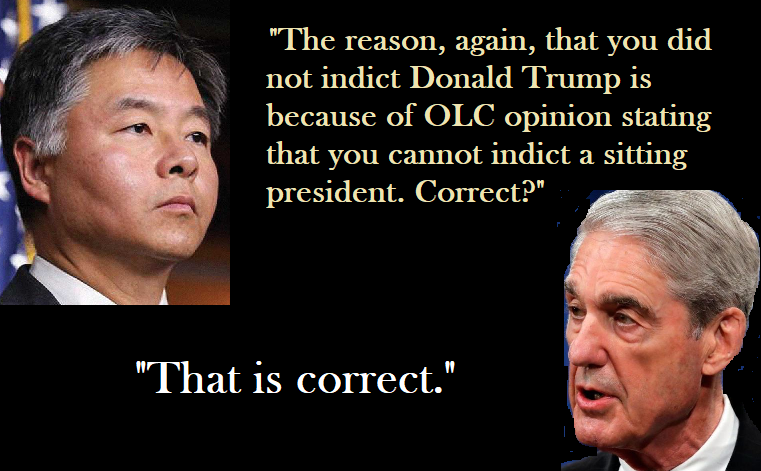
Mueller now tells Dem Rep Demings his investigation WAS impeded by lies/evasions from witnesses
Jeremy Schulman
Steve Chabot (R-Ohio) just claimed that the Steele dossier "started all this." That's not true, as @DavidCornDC explains https://www.motherjones.com/politics/20 ... mp-russia/ …
https://twitter.com/DavidCornDC
Here’s the Bullshit That Republicans Are About to Throw at Mueller
Be prepared.
Robert MuellerCarolyn Kaster/AP
When special counsel Robert Mueller appears before the House Judiciary and Intelligence committees on Wednesday, he will, no doubt, be asked about the damning conclusions of his report: Russia engaged in a “sweeping and systematic” attack on the 2016 election; Donald Trump and his aides publicly denied the Russian intervention was occurring but privately sought to benefit from it; Trump, during the campaign, hid from the public his concurrent effort to score a project in Moscow that could reap him hundreds of millions of dollars; and, as president, Trump took steps to derail the Russia probe that could amount to obstruction of justice.
A simple factcheck: completely false.
But it is likely that many Republicans on the two committees will do all they can to distract from these core components of the Trump-Russia scandal and will press Mueller on a host of diversionary matters that they and their compatriots in the conservative media have been hyping for the past two years. Their goal is simple: Peddle Deep State conspiracy theories to discredit Mueller and to protect Trump. They don’t have to persuade Americans to achieve their aim; they merely have to turn the Mueller hearings into a circus with unfounded allegations and enraged rants—anything to impede Mueller from clearly conveying the overall message of his report: Russia targeted the 2016 election to help Trump, Trump encouraged and accepted that, and then he sought to stop the investigation.
At every turn in the Russia probe, Trump’s comrades on the right have tried to assist him by claiming the real scandal is the investigation itself and how it began. They assert that Trump has been the victim of a US government cabal that kicked off this inquiry to keep Trump out of office. They have tried mightily to delegitimize the investigation, accusing the supposed Deep State (which apparently includes me) of spying on Trump to do him in.
It’s a good bet that when Republicans get their turn at the microphone during the Mueller hearings, several will seize the moment to advance this propaganda. So here’s a partial guide to some of the crap you can expect to hear from them when Mueller appears before Congress.
The FISA warrant
If you’ve paid any attention to Fox News, you know that that the right-wing proponents of so called “Spygate” are obsessed with an application the FBI submitted in order to surveil Carter Page, a onetime foreign policy adviser to the Trump campaign. Such top-secret warrants are presented to a secret court under the Foreign Intelligence Surveillance Act, and the law requires the feds to provide a judge information that justifies the surveillance. Page was an energy consultant who had done business in Russia; back in 2013, Russian spies had tried to recruit him—and appeared to have failed.
Page eventually found his way into Trump’s small group of national security advisers. And in July 2016, Page, while a Trump campaign adviser, traveled to Moscow, having been invited to give a speech at a prestigious college. There he interacted with several Russian officials. He emailed the Trump campaign that he had gathered “incredible insights” from Russian legislators and senior members of Vladimir Putin’s office. (Mueller would later note in his report, “Page’s activities in Russia—as described in his emails with the [Trump campaign]—were not fully explained.”)
Page also appeared in the memos former British intelligence officer Christopher Steele wrote in 2016 for an opposition research firm working for the Democratic National Committee and the Hillary Clinton campaign. Steele alleged that Page was being used as a go-between connecting the Trump campaign and Moscow and had met with a top Russian energy official to discuss an arrangement under which Trump, if elected president, would lift sanctions on Russia and Page and his associates would get a piece of a major energy deal. (Those claims have not been proven.) And this is what has caused the fuss on the right: The FBI cited the Steele dossier in its FISA application for Page. Sean Hannity and others have expressed outrage over this and have charged that an unsubstantiated report paid for by Democrats was the basis for kicking off surveillance on Trump.
In fact, because a redacted version of FISA application was made public, per a Trump order, we know that the Steele memos were not the sole basis of the submission. Moreover, the FBI did not file this FISA request until October 21, 2016—about a month after Page left the Trump campaign. He was merely a private citizen at this point. (The request was granted—and subsequently renewed several times, under the authority of then-Deputy Attorney General Rod Rosenstein, who was appointed by Trump.)
Even if the FBI erred in citing the Steele memos to obtain a surveillance warrant for Page—and FISA warrant mistakes do deserve scrutiny—this is hardly evidence of an anti-Trump conspiracy within the intelligence community. There were reasons beyond the Steele memos for the bureau to be interested in Page. And Page represented a small slice of the Russia investigation that had already been underway for months. Also, submitting a FISA application two weeks before Election Day—and not leaking word of it—hardly seems the work of a Deep State desperate to squash Trump, who was still considered an underdog. Many of Trump’s most ardent defenders in the House have fixated on the Page FISA application and the Steele dossier and have attempted to whip up shock over this. But this hullabaloo is akin to fretting about a mouse when a bear is at the door. Which brings us to…
The Steele dossier and the investigation
Another component of the conspiracy theory championed by Trump and his handmaids on the right is that the Steele memos are responsible for the FBI’s Russia investigation that Mueller inherited after Trump fired FBI chief James Comey. In January, Trump tweeted, “Remember it was Buzzfeed that released the totally discredited ‘Dossier,’ paid for by Crooked Hillary Clinton and the Democrats (as opposition research), on which the entire Russian probe is based!” A simple factcheck: completely false. Still, when Mueller testifies, Republicans may well bash away at the Steele memos as a stand-in for the Russia investigation itself, suggesting that these documents are somehow responsible for the probe. Their calculation: If you blast apart the memos, you undermine the basis for Mueller’s probe.
But the Steele memos did not trigger the Trump-Russia investigation. And one source for this is none other than Rep. Devin Nunes (R-Calif.), the former chairman of the House Intelligence Committee, who did all he could to hinder, if not wreck, that panel’s own Russia investigation. Remember when Nunes clumsily tried to back up Trump’s unfounded claim that President Barack Obama had wiretapped Trump in his precious tower? In early 2018, Nunes’ staff produced a memo—later publicly released—that tried to make the case the FBI had improperly sought the FISA warrant for Page. Key elements of the memo were debunked. But it did include a nugget that undid much of the right’s conspiracy theorizing. The memo confirmed previous reporting and testimony: The FBI’s Trump-Russia investigation was triggered in late July 2016 when the bureau learned that George Papadopoulos, another Trump campaign foreign policy adviser, had earlier in the year been told by a Russian intermediary that Moscow had thousands of Clinton emails and might weaponize them during the campaign. (Steele did forward his memos, as he wrote them, to an FBI contact during the summer of 2016, but he did not begin seriously talking with the bureau until October of that year.)
Trump has tried repeatedly to tie the Russia investigation to the memos—which contain some outlandish allegations that have been challenged or disproven—to discredit the whole probe. The Steele dossier is a good foil for Trump, a convenient diversion. Focusing on it draws attention from his own actions, particularly how he and his campaign aided and abetted the Russian attack by denying it was happening and by privately interacting with Russian go-betweens (and sending at least an implicit signal to Moscow that the Trump campaign did not mind the Russian intervention). So GOP legislators will probably shoot at the Steele dossier in order to present their competing narrative.
Strzok and Page
Another favorite set of targets for Republicans looking to provide Trump cover are former FBI agent Peter Strzok and former FBI lawyer Lisa Page. The two, who were having a romantic affair, traded texts critical of Trump as they worked on the Russia investigation and the bureau’s probe of Hillary Clinton’s use of a private email server when she was secretary of State. Trump and his crew have cited these texts as evidence that the FBI was out to get Trump from the start—and that the investigation was not begun in good faith.
Trump and his acolytes have brayed about a message Strzok sent to Page describing the Russia investigation as an “insurance policy,” claiming this meant the FBI was hellbent on blocking Trump from winning the White House or thwarting him if he did triumph. A much more benign interpretation seems likelier. As Strzok testified to Congress, some FBI officials advocated a go-slow probe of contacts between Trump’s camp and Russia, noting that Trump probably wouldn’t be elected, but Strzok wanted to move ahead with an aggressive counterintelligence investigation that would examine possible Russian efforts to infiltrate Trump’s inner circle in case Trump won the election. That was the “insurance policy.” He wanted the bureau to be ready on this front in what seemed the unlikely event of a Trump victory.
Still, during a congressional hearing a year ago, Rep. Louie Gohmert (R-Tex.) exploded at Strzok: “The disgrace is what this man has done to our justice system. There is the disgrace. And it won’t be recaptured anytime soon because of the damage you’ve done to the justice system. And I’ve talked to FBI agents around the country. You’ve embarrassed them. You’ve embarrassed yourself. And I can’t help but wonder when I see you looking there with a little smirk, how many times did you look so innocent into your wife’s eye and lie to her about Lisa Page?” The exchange went viral.
Mueller did remove Strzok from the Russia investigation after he learned of the text messages, which did show a personal bias. But there is no indication that Strzok’s or Page’s antipathy toward Trump influenced the investigation. A Justice Department inspector general’s report concluded that their texts did “cast a cloud” over the FBI, but it added, “We found no evidence that the conclusions by department prosecutors were affected by bias or other improper considerations; rather, we determined that they were based on the prosecutors’ assessment of the facts, the law, and past department practice.” Nevertheless, it will be rather surprising if Republicans at the Mueller hearings don’t reprise their attacks on Strzok and Page to draw fire away from Trump.
The big picture
Strzok and Page are only a piece of the uber-conspiracy theory cheered by Trump and his followers. The bottom line of their narrative is this: The FBI, as part of a grand plot, schemed to stop Trump from becoming president, and then, once he was in the White House, attempted to take him out. And the Russia investigation was the main tool for this job.
But…this doesn’t make sense. During the summer and fall of 2016, the FBI knew it was investigating the Russian attack and possible connections between the Trump campaign and Moscow. Did it reveal or leak this information to harm Trump? Not at all. It did the opposite. During an appearance before the House Judiciary Committee on September 28, 2016, Comey was asked repeatedly by Democrats if the bureau was examining links between the Trump campaign and Russia. He stuck to the rulebook and refused to answer the question. Perhaps more important, when the New York Times weeks later was investigating this subject, FBI sources told the paper’s reporters that it had found no ties between Trump and the Russian government. This is not what a Deep State conspiracy to smash Trump would have done. (Meanwhile, Comey revived the Clinton email server controversy in the final stretch of the campaign—a move that damaged Clinton and possibly resulted in Trump’s victory. Another Deep State oops?)
The FBI did not turn its Russia investigation into ammunition against Trump during the campaign. Nor did it do so after the election. It was not the FBI that leaked the Steele dossier—which contained lurid, unsubstantiated allegations about Trump cavorting with prostitutes in Moscow—to Buzzfeed, which posted the memos in early 2017. It was a John McCain aide—and he was horrified when the memos were made public. And shortly before Trump moved into the White House, Comey tried to give the president-to-be a head’s up about the dossier and its salacious contents. There is one inescapable conclusion: If there was a Deep State plotting against Trump, it did a damn poor job.
All of the above may be far too many weeds for the average viewer who tunes into the Mueller hearings. But for the past two years, the Trumpsters have tried conjuring all of this and more (I left out other mind-numbing details) into an alternative reality. A reality in which the Russian attack barely figures and doesn’t matter, in which Trump’s lies about his actions in Russia and his denials and dismissals of the Moscow assault do not exist. The endgame is not persuading America that their bizarre and untrue reality is what actually happened; it’s providing a counter to the damning (for Trump) reality that did transpire. Trump, Fox News, and the rest are purposefully breeding confusion and muddying up what truly is the most significant political scandal in modern American history.
Mueller’s report, though, presents a clear and basic view of what occurred. If his facts cannot be challenged, the Republicans will have to try to impeach his investigation, his people, and perhaps even Mueller himself. And if they cannot do that, the next best thing is to create a mess, make each of the two Mueller hearings a chaotic ruckus with plenty of theatrics, shouting, and conspiratorial charges. The cult of Trump has no choice. He is president in part because of the Russian attack. Worse, he encouraged it and helped Moscow cover it up. He then attempted to block the investigation. Neither Trump nor his supporters can admit this without undercutting his legitimacy. Any serious recognition, consideration, and acceptance of Mueller’s finding is a threat to Trump and his tribe. They need a different script—even if it’s fake.
https://www.motherjones.com/politics/20 ... mp-russia/
UNDER OATH
Mueller to Congress: Trump Could Be Charged With a Crime After He Leaves Office
The former special counsel also said that his Russia investigation did not exonerate the president.
Betsy Woodruff
Political Reporter
Sam Brodey
Congressional Reporter
Updated 07.24.19 11:40AM ET / Published 07.24.19 9:00AM ET
Photo Illustration by Kelly Caminero/The Daily Beast/Photo by Saul Loeb/Getty
Special Counsel Robert Mueller told Congress on Wednesday that he did not exonerate President Trump and that he could, in fact, be indicted after he leaves office.
In a curt exchange with Colorado Republican Rep. Ken Buck, the former special counsel said the Justice Department’s legal rules don’t shield Trump from criminal charges after he’s out of the White House.
“Could you charge the president with a crime after he left office?” Buck asked.
“Yes,” Mueller replied.
“You believe that he committed–you could charge the president of the United States with obstruction of justice after he left office?” Buck asked.
“Yes,” Mueller replied.
Committee Democrats, including Rep. Jamie Raskin, nodded excitedly through the exchange—the closest Mueller came to explaining the significance of his refusal to exonerate the president in his report on Russian interference in the 2016 election and possible obstruction by the White House. It followed a similar, shorter exchange earlier with the Democratic chairman of the House Judiciary Committee, Rep. Jerry Nadler.
Volume 90%
Earlier in his testimony, under questioning from Nadler, Mueller torpedoed two of Trump’s favorite lines.
Nadler asked Mueller if it was true that his report did not clear the president of obstruction of justice. Mueller answered, “Correct—it is not what the report said.”
“What about total exoneration?” Nadler asked, referring to a phrase the president has tweeted many times. “Did you actually totally exonerate the president?”
“No,” Mueller replied.
He also confirmed that Trump refused to sit for an interview with his team.
Republicans Rush to Frame Mueller as Old and Confused
"Federal Bureau of Investigation Director Robert Mueller is sworn in during a hearing before the House Judiciary Committee June 13, 2013 on Capitol Hill in Washington, DC. Mueller testified on the oversight of the FBI."
Robert Mueller’s Testimony Postponed to July 24
Mueller to Testify on Russia Probe Before Congress
In the first of back-to-back hearings, Mueller spoke slowly, and his speech was sometimes halting. In one back-and-forth, he had to ask the fast-talking Georgia Republican Rep. Doug Collins to repeat himself multiple times. He consulted the report throughout questioning, often pausing to scrutinize the book-length document.
In his exchange with Collins, he struggled to explain how his report distinguished between conspiracy and collusion. And at one point, he called the president “Trimp” instead of “Trump”––a verbal slip-up that damaged what could have been a valuable video clip for Democrats.
In one tense and awkward moment, Mueller opted not to defend himself against. Rep. Louie Gohmert. A famously bombastic Republican from Texas, Gohmert laid into Mueller over his handling of the anti-Trump texts one of his investigators, Peter Strzok, sent to another FBI employee with whom he was having an affair. Gohmert, raising his voice, told Mueller he had “perpetuated injustice.” Then Gohmert’s time ran out, and Nadler told Mueller he could reply to the incendiary accusations. But he didn’t.
“I take your question,” Mueller said, and left it at that.
One new tidbit of information came out in Gohmert’s questioning, though: Mueller said that when he met with Trump in early 2017 about his search for a new FBI director, he was not a candidate for the position. Trump has long maintained—and tweeted during the hearing—that Mueller tried to get the job and resented Trump for not hiring him.
In moment after moment throughout the hearing, Mueller refused to throw political bones to Democrats. A striking instance came when Rep. Hakeem Jeffries, a member of House Democratic leadership, pressed him on whether or not the president could be charged with obstruction of justice.
“Those are the elements of obstruction of justice,” Jeffries said, after describing how Trump ordered the White House Counsel to fire Mueller. “This is the United States of America. No one is above the law. No one. The president must be held accountable one way or the other.”
Mueller didn’t buy it––sort of.
“Let me just say, if I might, I don't subscribe necessarily to your––to the way you analyze that, I'm not supportive of that analytical charge,” he said, without elaborating.
Mueller also refused to read aloud from his report, another disappointment to Democrats who had hoped such moments could create viral video clips. When Rep. Ted Lieu, a firebrand California Democrat, asked him to do so, he refused.
“I’m happy to have you read it,” Mueller said with a smile.
Even before the first hearing began, the atmosphere in 2141 Rayburn on Wednesday morning matched the immense hype. Perennially late lawmakers were in their seats long before Mueller arrived in the room, chatting, joking, and in at least one case, literally biting their nails.
One of Mueller’s chief antagonists—Rep. Mark Meadows (R-NC), the chairman of the right-wing House Freedom Caucus, who does not sit on the committees that would question Mueller—sauntered into the room and took a seat in the audience, just a few feet behind the former special counsel.
While other GOP lawmakers tried and failed to get a seat in the room, Capitol Hill interns and members of the public waited overnight, sleeping in the marble hallways of Rayburn to make sure they snagged one. One seat opened up quickly when a man with his hair in a bun and a checkered keffiyeh started shouting about encrypted messages and Trump Tower Moscow as soon as Mueller entered; he was immediately escorted out by police.
As she walked into a room packed full of lawmakers, press, and cameras, Rep. Debbie Lesko, a freshman Republican from Arizona, succinctly summed up the vibe.
“This,” she said, “is a bit insane.”
The Capitol Hill doubleheader is the culmination, and all-but-certain conclusion, of Mueller’s work as special counsel—a job that started more than two years ago at a moment of extraordinary national tumult.
After the Intelligence Community released an assessment in January of 2017 that the Kremlin interfered in the 2016 election to try to help Trump win, then-FBI Director James Comey revealed the bureau was scrutinizing Trump World’s Russia ties. The disclosure enraged Trump, who then fired Comey, sending the Justice Department into emergency mode.
Attorney General Jeff Sessions had already recused himself from the Russia probe because of his role on Trump’s campaign. So Deputy Attorney General Rod Rosenstein, who was supervising the probe, named Mueller as special counsel and directed him to take it over. Mueller soon assembled a team of prosecutors and investigators to comb through all things 2016.
Naturally, controversy ensued. Republicans pointed to the fact that some members of Mueller’s team had donated to Democratic campaigns, and to the controversial career of Andrew Weissmann, a top Mueller deputy. And Congressional committees opened parallel probes, questioning witnesses, subpoenaing documents, and swimming in their own seas of controversy.
Over the next two years, Mueller plowed away. He questioned hundreds of witnesses and issued thousands of subpoenas. By the time he called it quits, his team had indicted more than 30 people and secured a host of guilty pleas, including from the president’s former National Security Advisor Michael Flynn and from George Papadopoulos, a foreign policy advisor to the Trump campaign. Longtime Republican operative Roger Stone is facing charges. And Paul Manafort, Stone’s former business partner and Trump’s former campaign chief, is serving a four-year sentence for crimes committed before the election season.
Mueller also charged a host of Russian nationals with breaking laws to influence the election. He zeroed in on the Internet Research Agency, a government-backed troll farm whose workers impersonated Americans to spread incendiary viral content via Facebook and Twitter. The trolls even organized real-life political rallies in the U.S., according to the report Mueller would later release.
The special counsel also farmed out a host of cases to different U.S. attorney’s offices, including a probe of the president’s inaugural committee.
After concluding his investigation, Mueller submitted a report on his work to Attorney General Bill Barr. Barr then released a brief letter downplaying its contents, which Mueller privately blamed for spreading “public confusion.” Members of Congress demanded the report’s immediate release, but it was several weeks before Barr, after putting it through a rigorous legal review, made it public—minus some redactions. But before the report dropped, he gave an unusual press conference that was widely viewed as an effort to spin the document in the most favorable way for the administration.
“President Trump faced an unprecedented situation,” Barr said at the press conference, appearing to defend Trump’s efforts to shutter Mueller’s probe. “As he entered into office, and sought to perform his responsibilities as President, federal agents and prosecutors were scrutinizing his conduct before and after taking office, and the conduct of some of his associates. At the same time, there was relentless speculation in the news media about the President’s personal culpability. Yet, as he said from the beginning, there was in fact no collusion.”
The report detailed a host of contacts between Russian nationals and the Trump campaign, as well as efforts by third parties (including Washington think tanker Dmitri Simes) to set up talks. Mueller found no evidence that denizens of Trump World conspired with the Russians who interfered in the election. He left the door open, however, to the possibility that Trump broke the law by obstructing justice. And his report detailed a host of steps Trump took to interfere with Mueller’s work, including multiple efforts to get subordinates to fire the Special Counsel.
Despite those moves, Mueller did not charge Trump with a crime. Explaining his decision, he pointed to a Justice Department legal finding that concluded prosecutors cannot charge sitting presidents with a crime.
“[I]f we had had confidence that the President clearly did not commit a crime, we would have said so,” Mueller said in his only public statement on the probe, at a question-free press conference.
“We did not, however, make a determination as to whether the president did commit a crime.”
The subtext: The ball is in Congress’s court. And now, in the witness seat, Mueller is there, too.
https://www.thedailybeast.com/mueller-t ... ref=scroll
emptywheel
Adam Schiff spends a lot more time on TV than Jerry Nadler and it shows. He has sober face nailed perfectly.
"That disloyalty may not have been criminal ... did not establish conspiracy beyond a reasonable doubt."
"his lifelong ambition, a Trump Tower in the heart of Moscow."
Welp. If Mueller isn't giving soundbite Adam Schiff will.
"Worse than all the lies and the greed, but the disloyalty to country."
"'Why not, everyone does it.' No, Mr President. They don't."
Nunes claims the Steele memo said Trump was a Russian agent. Two points:
1) No, it didn't.
2) The Mueller Report POINTEDLY did not address whether he was or not.
3) Mueller already testified today that blackmail was a real concern.
Okay--three points.
Nunes just misstated what Ohr's role is.
He also portrayed Alexander Downer as something other than Five Eyes intelligence.
https://twitter.com/emptywheel/status/1 ... 7235254273
For context, Fusion GPS was originally hired by Republicans opposing Trump in the primary. Also, Nunes knows full well that the Steele dossier was not the basis of the Fisa warrants. The lies start early and often
NEW: Senate Intelligence Committee Chairman Richard Burr broke with fellow Republican Devin Nunes on Tuesday, saying there were "sound reasons" for judges to approve the Foreign Intelligence Surveillance Act (FISA) warrant on Carter Page.
https://cnn.it/2A8ayIE


